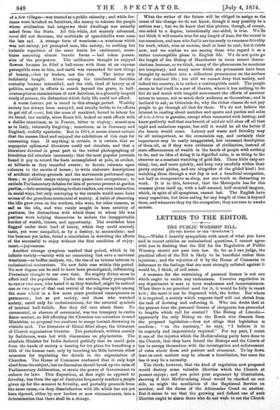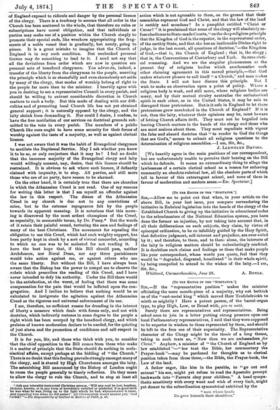LETTERS TO THE EDITOR.
THE PUBLIC WORSHIP BILL.
ETO THE EDITOE OF THE " SPEOTAT0/1.1
SIR,—Whilst I heartily sympathise with much of what you have said in recent articles on ecclesiastical questions, I cannot agree with you in desiring that the Bill for the Regulation of Public Worship should not pass into law. So far as I can judge, the practical effect of the Bill is likely to be beneficial rather than injurious ; and the rejection of it by the House of Commons in deference to the feelings that are most strongly enlisted against it would be, I think, of evil omen.
A measure for the restraining of personal licence is not one which ought to excite any enthusiasm. Coercive regulation in any department is sure to have weaknesses and inconveniences. When there is no practical need for it, it would be folly to resort to it ; the more it can be dispensed with, the better. But where it is required, a society which respects itself will not shrink from the task of devising and enforcing it. Who can doubt that at the present time the personal licence of clergymen has proceeded to lengths which call for control ? The Bishop of Lincoln— apparently the only Bishop on the Bench who dissents from the proposed legislation—does not allege that legislation is needless ; "on the contrary," he says, "I believe it to be urgently and imperatively required." For my part, I count it one of the injuries which the Medimvalising party have done to the Church, that they have forced the Bishops and the Courts of law to occupy themselves with the investigation and enforcement of rules about dress and posture and ornament. To lay down laws on such matters may be almost a humiliation, but none the less it may be a necessity.
You think, however, that the kind of regulation now proposed would destroy some valuable liberties which the Church at present enjoys ; and you point your argument by illustrations, showing if that Mediscvalising ritual would be checked on one side, so might the mutilation of the Baptismal Service on another, and the disuse of the Athanasian Creed on another. But it seems to me that the growing and defiant use of such liberties ought to alarm those who do not wish to see the Church
of England exposed to ridicule and danger by the personal licence of the clergy. There is a tendency to assume that all order in the Church has been scattered to the winds, that therefore no rules or subscriptions have moral obligation, and that individuals or parties may make use of a position within the Church simply to promote their special ends, like wreckers appropriating the frag- ments of a noble vessel that is gradually, but surely, going to pieces. It is a great mistake to imagine that the Church of England is in any such condition. But unchecked personal licence may do something to lead to it. I need not say that all the deviations from order which are now in question are personal acts of beneficed clergymen. You advocate, indeed, a transfer of the liberty from the clergyman to the people, asserting the principle which is so shamefully and even shamelessly set aside by many of the clergy, that modes of worship belong of right to the people far more than to the minister. I heartily agree with you in desiring to see a representative Council in every parish, and should be willing to entrust considerable discretion in Church matters to such a body. But this mode of dealing with our diffi- culties and of promoting local Church life has not yet obtained general support ; it is naturally opposed by the clergy, and the laity shrink from demanding it. Nor could I desire, I confess, to have the free mutilation of our services on doctrinal grounds sub- mitted to the vote in every parish. The members of a public Church like ours ought to have some security for their forms of worship against the taste of a majority, as well as against clerical licence.
I was not aware that it was the habit of Evangelical clergymen to mutilate the Baptismal Service. May I ask whether you know it to be so, or only conjecture that it may be ? I feel no doubt that tho immense majority of the Evangelical clergy and laity would willingly consent, nay, desire, that this licence should be restrained. It is obvious to ask where such licence, if defiantly claimed with impunity, is to stop. All parties, and still more those who are of no party, have reason to be alarmed.
On the other hand, it is certainly true that there are churches in which the Athanasian Creed is not read. One of my reasons for writing this letter is that I am myself an offender against the law in this respect. The disuse of the Athanasian Creed in my church is due not to any convictions of mine, but to the extreme repugnance felt by the people towards its apparent meaning. It is notorious that this mean- ing is disavowed by the most ardent champions of the Creed, as especially, in memorable terms, by Dr. Posey.* But the words of it retain their painful sound, torturing the ears and feelings of many of the best Christians. The movement for repealing the obligation to use this Creed, which had such weighty support, has been partly kept in check by a sort of virtual concordat, according to which no one was to be molested for not reading it. I have the best hope that, if this Bill should pass, neither Archdeacon, nor Rural Dean, nor any three parishioners would take action against me, or against others who use the same liberty. But without the Bill, I have always been aware that the Bishop has the power to compel me to observe the _rubric which prescribes the reading of this Creed, and I have • never intended to defy his authority. Under the Bill there would be the satisfaction, at the worst, of feeling that there was some compensation for the pain that would be inflicted upon the con- gregation. And I incline to believe that nothing would be so calculated to invigorate the agitation against the Athanasian Creed as the rigorous and universal enforcement of its use.
I see, therefore, no sufficient reason for dreading in the interest of liberty a measure which deals with forms only, and not with doctrine, which indirectly restores in some degree to the people a right which has been usurped by the beneficed clergy, and which prelates of known moderation declare to be needed, for the quieting of just alarm and the promotion of confidence and self-respect in the Church.
It is for you, Sir, and those who think with you, to consider that the chief opposition to the Bill COMES from those who make it a matter of principle that the State should do nothing in cede- sfiastical affairs, except perhaps at the bidding of "the Church." There is no doubt that this feeling prevails strongly amongst many of the clergy, and is shared by High Churchmen amongst the laity. The astonishing Bill announced by the Bishop of London ought to rouse the people generally to timely reflection. Do they mean to allow the clergy to rule the Church, and to stop at least all
"Ask any tolerably-instructed Christian person, 'Will any soul be lost, heathen, idolater, heretic, or in any form of hereditary unbelief or misbelief, if in good faith ..
-ae was what he was, living up to the light which be bad, whencesoever it came. t "men whose head%
And repenting him when he did amiss?' All Christendom would answer you, 'God i
forbicli."—The Responsibility of Intellect in Matters of Faith, p. 45. Do grow beneath their shoulders." action which is not agreeable to them, on the ground that their assemblies represent God and Christ, and that the law of the land is earthly and mundane ? In a pamphlet entitled "Christ or Cmsar? " it is proclaimed that some of the clergy will absolutely re- f use obedience to State-made Courts, "on the deep religious principle that the Kiugdon of God is the superior, in the supernatural order, of the earthly State, and that she has an inalienable Divine right to judge, in the last resort, all questions of doctrine,"—the Kingdom of God,—that is, the Church of England ; that is, the clergy ; that is, the Convocations of Canterbury and York. So runs cleri- cal reasoning. And we see the singular phenomenon at the present day of religious bodies which anathematise each other claiming agreement in this sacred principle,—that God makes whatever pleases to call itself " a Church," and man makes
the State. 1 will not here discuss this principle. But I wish to make an observation upon a point of policy. Where a religious body is weak, and still more, where religious bodies are many, and by their mutual rivalry neutralise the ecclesiastical spirit in each other, as in the United States, it may be safe to disregard these pretensions. But is it safe in England to let these pretensions grow unrebuked in the Church of England? If it is not, then the laity, whatever their opinions may be, must beware of letting Church affairs drift. They must not be beguiled into leaving Church matters in the hands of the clergy and those who are most zealous about them. They must repudiate with vigour the false and absurd doctrine that "to render to God the things that are God's," means to submit all religious questions to the determination of religious assemblies.—I am, Sir, &c., J. LLEWELYN DAVIES.
[We heartily agree in the main positions of our correspondent, but are unfortunately unable to perceive their bearing on the Bill which he defends. It seems an extraordinary thing to allege the lawlessness of a certain clerical school as a reason for enforcing summarily an obsolete rubrical law, all the obsolete parts of which tell in favour of this extravagant school, and none of them in favour of moderation and modern sense.—En. Spectator.]



































 Previous page
Previous page